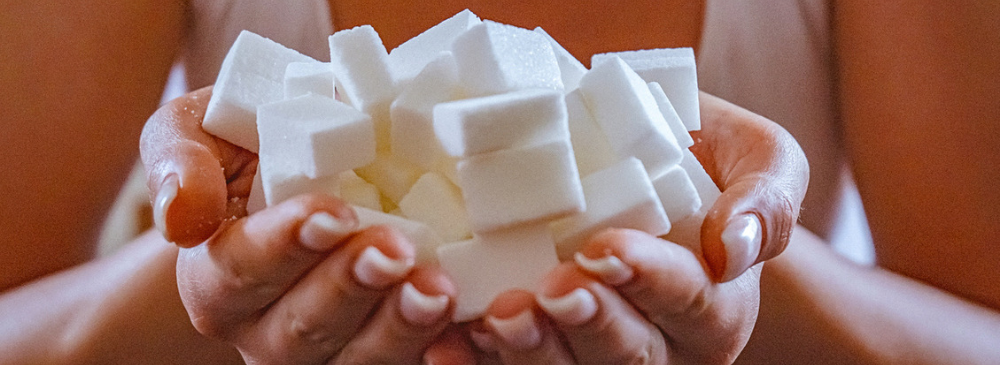Sugar is sugar, right? Not quite. Just because the nutritional label on your granola bar doesn’t say “sugar” as a listed ingredient doesn’t mean there isn’t any lurking in your “healthy” afternoon snack. There are at least 61 different names for sugar! But be wise, just because something contains sugar doesn’t mean it’s bad for you. It’s the amount of sugar you need to be concerned about. The higher up it is on the list of ingredients, the more sugar the product contains.
Check product labels for added sugar per gram in the food you eat. According to the American Heart Association, the maximum amount of added sugar men should eat per day is 150 calories, or 37.6 grams. For women, it’s 100 calories, or 25 grams per day.
But Why?
We all hear how bad sugar is for us, but what’s all the fuss? Our bodies crave it and it tastes good right? Unfortunately, sugar affects the way our bodies fight disease. Bacteria and yeast feed on sugar, so too much of it in your body can have negative impacts on different parts of your system.
Your Liver
Too much fructose, or fruit sugar, can lead to fatty liver disease, and eventual cirrhosis. In addition, excess sugar consumption can cause your liver cells to become resistant to insulin, the hormone that turns sugar into energy. If you can’t control your blood sugar it can lead to type 2 diabetes.
Your Kidneys
Your kidneys are your body’s filter and they can only take so much. At a certain point, they can’t filter any more and sugar is released into your urine - a common sign of diabetes. After time, the excess sugar damages your kidneys leading to kidney failure.
Your Brain
When you eat sugar, your brain releases dopamine, the “feel good” chemical. Fruits and veggies don’t contain added sugar like candy bars, so you don’t get that high of dose of dopamine from them. The more added sugar you ingest, the higher the dose of dopamine your brain produces. This causes the cravings you get for more sugar and it can turn into a never-ending cycle, much like addiction.
Your Mood
That dopamine your brain releases when you eat a candy bar makes you feel good as your blood sugar level rises. However, as sugar is absorbed, that level drops making your feel uneasy or jumpy. This influences your mood. High amounts of sugar in some diets have been associated with depression.
Your Heart
You know how we talked about insulin and your liver? Well, that excess sugar causing extra insulin in your blood affects your arteries too. It causes the walls of the arteries to become thick and tense, adding stress to your heart. Heart stress is associated with strokes, heart disease, high blood pressure and heart attacks.
Your Weight
No surprise here, excess sugar leads to wait gain. Things like soda, juice, fast food, candy, sugary snacks and other sweets have added sugar in them making them the biggest culprit for added pounds.
Your Sex Life
Yeah, let’s talk about it. Sugar affects your circulatory system, i.e. blood flow. Poor blood flow equals erectile dysfunction.
Your Skin
Sugaring is one thing, but too much sugar in your bloodstream can increase aging by damaging collagen and elastin, two proteins that keep your skin firm and tight. When these are damaged, it leads to wrinkly and saggy skin.
Your Smile
You knew it was coming! Cavities are caused by bacteria in your mouth. Those bacteria thrive on sugar. As bacteria digest sugar, they excrete (think poop) acid. That acid demineralizes your enamel. When enough enamel is lost, a cavity can form. The bacteria in that cavity then become a reservoir for the rest of your mouth. Combine this with sugar in your diet, and cavities can develop in other teeth. The more sugar you eat, the more food you are supplying to your cavities.
The Most Common Names for Sugar
• Dextrose
• Fructose
• Galactose
• Glucose
• Lactose
• Maltose
• Sucrose
Common Names for Solid or Granulated Sugar
• Agave Nectar
• Barbados sugar
• Barley malt
• Beet sugar
• Brown sugar
• Cane juice crystals
• Cane sugar
• Castor sugar
• Coconut sugar
• Confectioner's sugar (aka powdered sugar)
• Corn syrup solids
• Crystalline fructose
• Date sugar
• Demerara sugar
• Dextrin
• Diastatic malt
• Ethyl maltol
• Florida crystals
• Golden sugar
• Glucose syrup solids
• Grape sugar
• Icing sugar
• Maltodextrin
• Muscovado sugar
• Panela sugar
• Raw sugar
• Sugar (granulated or table)
• Sucanat
• Turbinado sugar
• Yellow sugar
Common Names for Liquid or Syrup Sugars
• Agave Nectar/Syrup
• Barley malt
• Blackstrap molasses
• Brown rice syrup
• Buttered sugar/buttercream
• Caramel
• Carob syrup
• Corn syrup
• Evaporated cane juice
• Fruit juice
• Fruit juice concentrate
• Golden syrup
• High-Fructose Corn Syrup (HFCS)
• Honey
Want to learn more?
Talk to your dentist. If you have any questions about how sugar impacts your teeth and overall health, ask them. They're happy to explain how it works and how to avoid potential danger from sugar.
Don’t have a dentist? Create or sign in to your MySmile® account to search for an in-network dentist near you. You can even filter your results by patient endorsements!












